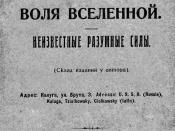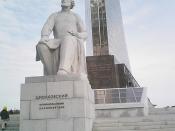Konstantin Eduardovitch Tsiolkovsky
1857-1935
Konstantin Tsiolkovsky was a true visionary and pioneer of astronautics. He theorized many aspects of human space travel and rocket propulsion decades before others, and played an important role in the development of the Soviet and Russian space programs.
He was born on September 17,1857, in the village of Ijevskoe, Ryasan Province, Russia, the son of a Polish forester who had emigrated to Russia. He was not from a rich family, but a very large one; Konstantin Tsiolkovsky had 17 brothers and sisters. At the age of 10 he lost his hearing as the result of scarlet fever. After that he couldn't attend school, and he never received any formal education. He achieved the knowledge and education that he had attained. His books were his teachers, and he read every book in his father's library. Tsiolkovsky later remembered that his hearing loss influenced greatly his future life: during all his life he tried to prove to himself and to others that he was better and more clever than others, even with his disability.
Tsiolkovsky blended the passion for space with hard mathematical calculations to produce not only the dream inspired by Jules Verne, but also a vision for the future. He imagined a time when space ships would launch from the Earth to large space stations and colonies; from there he proposed these ships would propel humanity to explore the Moon and Mars. He predicted solar power stations, space suits, and artificial gravity, as well as predicting humanity's first attempts at terraforming other worlds and living in the asteroid belt and beyond, i.e. near the great gas giants. Tsiolkovsky had stated: "Earth is the cradle of mankind; one does not remain in the cradle forever."
Tsiolkovsky was an unlikely philosopher of the space movement, working, as...


